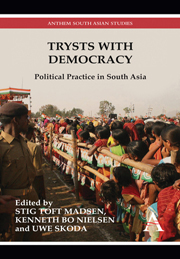Book contents
- Frontmatter
- Contents
- List of Tables
- List of Abbreviations
- Glossary
- Map of South Asia
- Acknowledgements
- 1 Introduction
- Part One Theoretical Issues
- Part Two India
- 4 Ajit Singh S/O Charan Singh
- 5 A Princely Politician in an Indigenised Democracy: A Raja and his Electoral Situation in Rural Orissa 2004
- 6 A Political Breakthrough for Irrigation Development: The Congress Assembly Campaign in Andhra Pradesh in 2003–2004
- 7 Congress Factionalism Revisited: West Bengal
- Part Three Beyond India
- About the Editors
- About the Contributors
5 - A Princely Politician in an Indigenised Democracy: A Raja and his Electoral Situation in Rural Orissa 2004
from Part Two - India
Published online by Cambridge University Press: 05 March 2012
- Frontmatter
- Contents
- List of Tables
- List of Abbreviations
- Glossary
- Map of South Asia
- Acknowledgements
- 1 Introduction
- Part One Theoretical Issues
- Part Two India
- 4 Ajit Singh S/O Charan Singh
- 5 A Princely Politician in an Indigenised Democracy: A Raja and his Electoral Situation in Rural Orissa 2004
- 6 A Political Breakthrough for Irrigation Development: The Congress Assembly Campaign in Andhra Pradesh in 2003–2004
- 7 Congress Factionalism Revisited: West Bengal
- Part Three Beyond India
- About the Editors
- About the Contributors
Summary
‘I am a member of the old ruling class.… I belong to an unlucky generation, swung between the old world and the new, and I find myself ill at ease in both. And what is more, as you must have realized by now, I am without illusions.…’
(Prince of Salina, in Tomasi Di Lampedusa's ‘The Leopard’)Introduction
A little more than a decade ago, Sahlins (1999) argued that we are encountering an indigenisation of modernity, that is, the world is ‘being re-diversified by indigenous adaptations to the global juggernaut’. Exogenous elements are being integrated into and adapted to one's own culture. In passing one may note a small example of this constant process in Sahlins' quote itself: the term ‘juggernaut’, originating in present-day Orissa as an Anglicization of Lord Jagannath (Lord of the Universe), whose ‘powerful force’ is demonstrated in the annual car festival (rath yatra), apparently impressed the British colonisers. This cultural encounter not only led to the adoption of this word by the English language, the word itself also acquired a new meaning in the process.
More recently, such dynamics of indigenisation have been explored in relation to democracy in India (de Souza 2006; Michelutti 2007; Tanabe 2007), from which it has been demonstrated that democracies are equally culturally inflicted. Processes of democratisation depend largely on already existing socio-cultural configurations, depositions and repertoires.
- Type
- Chapter
- Information
- Trysts with DemocracyPolitical Practice in South Asia, pp. 103 - 134Publisher: Anthem PressPrint publication year: 2011
- 2
- Cited by



